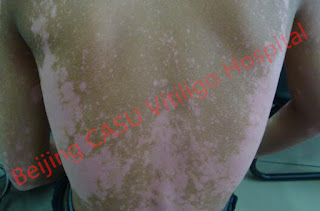Vitiligo is an ugly skin disease in which the skin cells that produce melanin
and pigment are destroyed. Melanin is the crucial substance that gives us
natural skin color. When people get vitiligo, the hair in the affected areas
will become white. This skin condition is extremely terrible because it makes us
become “freaks”.
Vitiligo (leucoderma) is a distressing skin condition marked by gradual loss of melanocytes, the cells responsible for producing melanin pigment in skin layers which results in irregular white patches.
The following self-care tactics may help you care for your skin and improve its appearance:
Protect your skin from the sun and artificial sources of UV light. If you have vitiligo, particularly if you have light skin, use a broad-spectrum, water-resistant sunscreen with an SPF of at least 30. Apply sunscreen generously and reapply every two hours — or more often if you're swimming or perspiring.
You can also seek shade and wear clothing that shields your skin from the sun.
Protecting your skin from the sun helps prevent sunburn and long-term damage. A bad sunburn can make your condition worse. Sunscreen also minimizes tanning, which makes the contrast between normal and discolored skin less noticeable.
Conceal affected skin. Concealing products may improve the appearance of the skin and help you feel better about yourself, especially if your vitiligo patches are on exposed skin. You may need to try several brands of makeup or self-tanners to find one that blends well with your normal skin tone. The coloring of self-tanning products doesn't wash off, but it gradually fades over several days. If you use a self-tanner, select one that contains dihydroxyacetone, as it is approved by the Food and Drug Administration.
Don't get a tattoo. Avoid tattooing that's not related to treating your vitiligo. Damage to your skin, such as that caused by a tattoo, may cause a new patch of vitiligo to appear within two weeks.
Say no to stress: Stress (physical or emotional) has been found to be the prime trigger of genealogical disturbances that result in and promote the growth of vitiligo. Indulge in creative pursuits to stay clear of emotional stress. Lifestyle changes to incorporate practices like meditation, yoga and other relaxation exercises is the best thing you can do arrest the growth of vitiligo.
Babchi seeds: Babchi seeds combined with tamarind powder is one of the best home remedies for vitiligo. Equal amount of both the seeds should be soaked in water for three to four days. They should then be shelled and dried in the shade before being made into a paste. The resultant paste should be applied to the white patches for a week. Some skins are sensitive to babchi seeds. If the application of paste causes itching or the white spots become red this treatment should be discontinued.
Vitiligo (leucoderma) is a distressing skin condition marked by gradual loss of melanocytes, the cells responsible for producing melanin pigment in skin layers which results in irregular white patches.
The following self-care tactics may help you care for your skin and improve its appearance:
Protect your skin from the sun and artificial sources of UV light. If you have vitiligo, particularly if you have light skin, use a broad-spectrum, water-resistant sunscreen with an SPF of at least 30. Apply sunscreen generously and reapply every two hours — or more often if you're swimming or perspiring.
You can also seek shade and wear clothing that shields your skin from the sun.
Protecting your skin from the sun helps prevent sunburn and long-term damage. A bad sunburn can make your condition worse. Sunscreen also minimizes tanning, which makes the contrast between normal and discolored skin less noticeable.
Conceal affected skin. Concealing products may improve the appearance of the skin and help you feel better about yourself, especially if your vitiligo patches are on exposed skin. You may need to try several brands of makeup or self-tanners to find one that blends well with your normal skin tone. The coloring of self-tanning products doesn't wash off, but it gradually fades over several days. If you use a self-tanner, select one that contains dihydroxyacetone, as it is approved by the Food and Drug Administration.
Don't get a tattoo. Avoid tattooing that's not related to treating your vitiligo. Damage to your skin, such as that caused by a tattoo, may cause a new patch of vitiligo to appear within two weeks.
Say no to stress: Stress (physical or emotional) has been found to be the prime trigger of genealogical disturbances that result in and promote the growth of vitiligo. Indulge in creative pursuits to stay clear of emotional stress. Lifestyle changes to incorporate practices like meditation, yoga and other relaxation exercises is the best thing you can do arrest the growth of vitiligo.
Babchi seeds: Babchi seeds combined with tamarind powder is one of the best home remedies for vitiligo. Equal amount of both the seeds should be soaked in water for three to four days. They should then be shelled and dried in the shade before being made into a paste. The resultant paste should be applied to the white patches for a week. Some skins are sensitive to babchi seeds. If the application of paste causes itching or the white spots become red this treatment should be discontinued.
